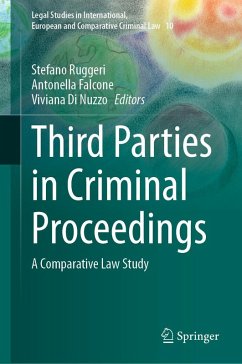This book deals with the role and the protection of third parties in criminal proceedings. Starting from a comparative-law definition of formal parties in criminal proceedings based on seven domestic jurisdictions, this research focuses on the increasing impact of criminal investigations and criminal trials on different categories of third parties, i.e. those individuals who, without being suspected or accused of a criminal offence, are involved in criminal investigations and trials. The complex features of this topic require a further analysis from another comparative perspective that looks at the protection of victims and third parties at the levels of international and supranational law. Particular attention is firstly be devoted to the acknowledgment of a set of procedural safeguards to victims and individuals other than formal participants in criminal proceedings by means of the enormous contribution made by international human rights courts, with a specific focus on the European Court of Human Rights and the Inter-American Court of Human Rights. Regarding victims in particular, their multifaceted status are also examined from the viewpoint of international criminal justice as well. The European scenario, moreover, allows for further deepening of the role and the procedural guarantees granted to third parties and victims from the viewpoint of EU law in relation to the area of freedom, security and justice, in which additional human rights challenges emerge in the field of transnational criminal justice. Comparison shall at all levels be carried out in the light of the enormous transformations due to the digital transition, which has brought about unbelievable changes in every area of mankind's life, including criminal justice. Ever newer tools, indeed, govern procedural activities, and although unprecedented investigative measures allow for increasingly accurate fact-finding, new risks also arise, including those vis-à-vis third parties whose procedural rights risk to be inevitably infringed.
Dieser Download kann aus rechtlichen Gründen nur mit Rechnungsadresse in A, B, BG, CY, CZ, D, DK, EW, E, FIN, F, GR, HR, H, IRL, I, LT, L, LR, M, NL, PL, P, R, S, SLO, SK ausgeliefert werden.









